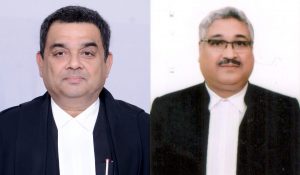State Interference in Personal Relationships an Encroachment on Right to Freedom of Choice: Allahabad HC
Photo Credit: The Indian Express
Amid the ongoing debate on “Love-Jihad”, a division bench of the Allahabad High Court has held that a single-judge bench decision holding that religious conversion just for the purpose of marriage is unacceptable, is not good law.
The bench added that the 2014 decision in Noor Jahan Begum @ Anjali Mishra and Another vs. State of U.P. and Others and followed in Priyanshi @ Km. Shamren and others Vs. State of U.P. and Another recenlty, did not deal with the issue of life and liberty of two mature individuals in choosing a partner or their right to freedom of choice regarding who they would like to live with.
“To disregard the choice of a person who is of the age of majority would not only be antithetic to the freedom of choice of a grown-up individual but would also be a threat to the concept of unity in diversity”, a bench of Justices Pankaj Naqvi and Vivek Agarwal said.

Justice Pankaj Naqvi and Justice Vivek Agarwal.
It added Right to live with a person of his/her choice irrespective of religion professed by them, is intrinsic to right to life and personal liberty.
The bench was ruling on a petition filed by the husband Salamat Ansari and others seeking to quash an FIR filed against him by the father of Priyanka Kharwar @ Alia for allegedly kidnapping his daughter, who abandoned Hinduism to marry Ansari.
The court said it did not see Priyanka Kharwar and Salamat as Hindu and Muslim, rather as two grown-up individuals who out of their own free will and choice had been living together peacefully and happily over a year.
Right to live with a person of his/her choice irrespective of religion professed by them, is intrinsic to right to life and personal liberty
“The Courts and the Constitutional Courts, in particular, are enjoined to uphold the life and liberty of an individual guaranteed under Article 21 of the Constitution of India. Right to live with a person of his/her choice irrespective of religion professed by them, is intrinsic to the right to life and personal liberty”, the Court said.
It went on to state that the interference in a personal relationship would constitute a serious encroachment into the right to freedom of choice of the two individuals.
The decision of an individual, who is of the age of majority, to live with an individual of their choice is strictly a right of an individual, the court held, and when this right is infringed upon it would constitute breach of their fundamental right to life and personal liberty as it includes the right to freedom of choice, to choose a partner and the right to live with dignity as enshrined in Article 21 of the Constitution of India.
The UP Government opposed the petition and argued that that conversion per se for contracting marriage was prohibited; such a marriage had no sanctity in law, thus the court should not exercise its extraordinary jurisdiction in favour of such a couple.
We fail to understand that if the law permits two persons even of the same sex to live together peacefully then neither any individual nor a family nor even State can have objection to relationship of two major individuals who out of their own free will are living together
The court found that once the age of Priyanka Kharwar @ Alia was not in dispute as she is reported to be around 21 years, the petitioner could not be accused of committing an offence under Section 363 (kidnapping), or Section 366 (Kidnapping, abducting or inducing woman to compel her marriage, etc.) of the IPC as the so-called victim had left her home on her own in order to live with Salamat Ansari. Further, once Priyanka Kharwar @ Alia was found not to be a juvenile, an offence under Section 7/8 POCSO Act also could not be made out.
In view of this background, the court also held that allegations relating to offences under Section 352, 506 against Ansari’s family members appeared to be exaggerated and malafidely motivated with a view to implicate them.
The bench eventually quashed the FIR against the husband and co-petitioners.
The article was originally published in The Leaflet.
Read the Order
Get the latest reports & analysis with people's perspective on Protests, movements & deep analytical videos, discussions of the current affairs in your Telegram app. Subscribe to NewsClick's Telegram channel & get Real-Time updates on stories, as they get published on our website.























